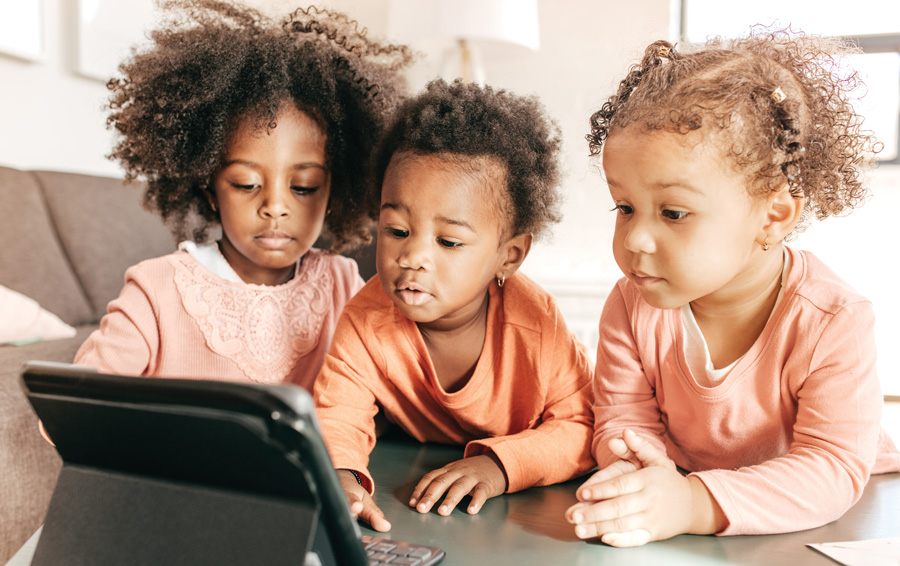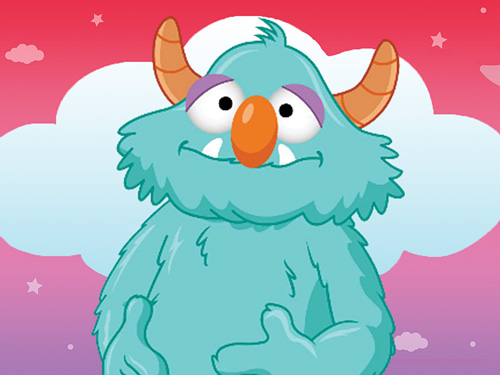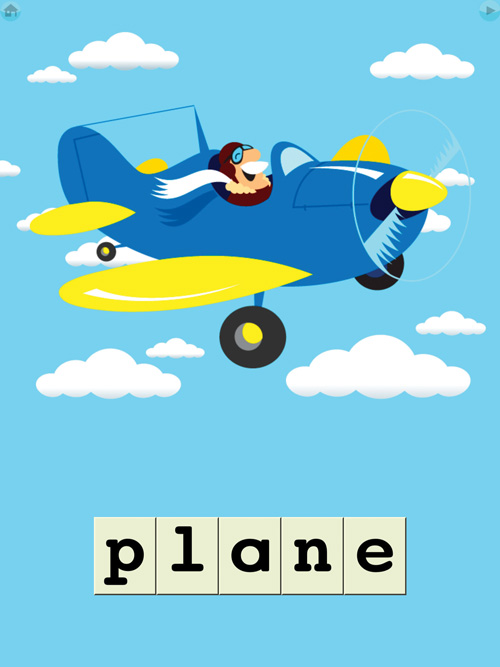Great Preschool Apps | Mix It Up
Here, experts pick their favorites for the preschool set (children aged three to five) and highlight key concepts explored in these notable apps.

THE AMERICAN ACADEMY OF PEDIATRICS' guidelines for screen time and use of visual media with preschoolers, released in 2016, emphasize the importance of caregiver-child interaction, stressing that adults should mediate the experience for young children, rather than having them interface with a screen alone.
Some librarians and educators have reservations about recommending any screen time with preschoolers. A recent study out of the Hospital for Sick Children of Toronto found a link between the amount of passive handheld screen time and a delay in expressive speech in toddlers. While the authors of the study state that their findings do not prove a direct causation, they certainly give parents and caregivers pause.
It's imperative that we model positive digital habits for our patrons, no matter how we personally feel about screen time. After all, serving as media mentors is part of our job. Recommending quality content, though, is no small feat. Apps-both good and bad-abound. We've selected our favorites for the preschool set (specifically, children aged three to five) and highlighted key concepts explored in these notable apps.
Top PreK App Developers
Duck Duck Moose (iOS, Android) | Free
You can't go wrong with a Duck Duck Moose app. Though we are partial to their nursery rhyme options (both "Wheels on the Bus" and "Old MacDonald" are standouts), any of their offerings are excellent choices for  preschool-aged users. Visit their website to see a breakdown of various categories (Play, Creative Expression, Curriculum, Khan Academy, and Nursery Rhymes) along with age recommendations. Basic math and vocabulary-building apps are also noteworthy options. All Duck Duck Moose apps are free and contain no advertising.
preschool-aged users. Visit their website to see a breakdown of various categories (Play, Creative Expression, Curriculum, Khan Academy, and Nursery Rhymes) along with age recommendations. Basic math and vocabulary-building apps are also noteworthy options. All Duck Duck Moose apps are free and contain no advertising.
Toca Boca (iOS, Android) | $2.99/app
A perfect marriage of technology and play, Toca Boca creates apps that celebrate the exploratory nature of childhood. A great example of an app that encourages children's agency is Toca Band. The app allows users to select from a cast of characters to craft an ensemble of performers who sing, whistle, and play instruments, all while creating silly songs. There's no right or wrong way to assemble the performers. Toca Boca's apps are bright and cheery, but not overly stimulating. Bundles are available for a slight discount, and all of their products are ad-free.
Sago Mini (iOS, Android) | $2.99/app
Much like Toca Boca, Sago Mini offers a suite of apps that celebrate exploration and discovery. Aimed squarely at the preschool set, Sago Mini's apps are best experienced with a child-adult pairing. Many of their apps offer children a chance to learn new and unusual vocabulary words. For example, in Pet Cafe, users get to pour their own milkshake and, if it's "eaten" too quickly, their character might get brain freeze! Sago Mini creates interactive sandbox experiences in unusual worlds: under the ocean (Ocean Swimmer), in space (Space Explorer), and in the sky (Planes). Bundles are available for a slight discount, and all of their products are ad-free.
Top Preschool Apps
 Breathe, Think, Do with Sesame
Breathe, Think, Do with Sesame
by Sesame Street Workshop (iOS and Android)
Free | Ages 4 Up
Follow a monster through a set pattern of strategies (breathe, think, do) to solve problems like putting on shoes or separating from a parent at the beginning of school. Repetition is used throughout each scenario to reinforce the idea of pausing and thinking before reacting. A small amount of gamification is employed as users have to pop bubbles as they think things through. Many of these scenarios are fitting for children who are about to start school. While it's not the type of app to keep a little one busy for long, use could be parsed out by scenario. This app has both English and Spanish settings.
Build and Play; Build and Play 2
by Croco Studio (iOS and Android)
$2.99/app | Ages 3 Up
Assemble planes, trains, and all sorts of automobiles in this interactive, puzzle-like game. Rather than offering a "static" puzzle-assembling experience, the Build and Play app rotates and moves the object as it's being reassembled. It's a unique offering that encourages users to place the object's pieces (plane wings, engine, propeller, tail) in a certain order-which is no small feat for the preschool age range. Upon completing each object, users then get to "play" and move the object-a nice reward after assembling each vehicle.
First Words Sampler by Learning Touch (iOS and Android)
Free | Ages 3 Up
In this free sampler version, children are presented with an illustration and tiles with letters on them to start on the road to letter and sound recognition and basic spelling. Children tap on the letter and slide them into place to spell out the desired word. It is impossible to put the letter in the wrong spot, so success is imminent. While there are no in-app purchases for youngsters, adults can buy more games through the app.
place to spell out the desired word. It is impossible to put the letter in the wrong spot, so success is imminent. While there are no in-app purchases for youngsters, adults can buy more games through the app.
Play and Learn Science by PBS Kids (iOS and Android)
Free | Ages 3 Up
New and interesting scientific vocabulary is introduced along with images to reinforce them. Learn about life sciences, physical science, and earth science through temperature and thermometers, shadow and light, near and far, targets, rolling, and more. Of note: users can toggle between English and Spanish. Worthy for its rich content and preschool simplification of scientific concepts.
RelationShapes by VizuVizu (iOS and Android)
Free | Ages 3 Up
More than 300 puzzles encourage young users to construct and match. Craftily imparting concepts such as spatial reasoning, logic, and problem-solving, this app is simple enough for the youngest of users to enjoy (with or without a grown-up's support), and just open-ended enough for an older pre-K user to really get creative. Kids can also team up, each taking one half of the puzzle. It's a unique app that fills the need for preschool-friendly mathematics and spatial-thinking apps.
Worthwhile Reading on the "Screen Time Debate"
"American Academy of Pediatrics Announces New Recommendations for Children's Media Use"
(via American Academy of Pediatrics)
The most up-to-date guidelines (2016) from the AAP, offering policy recommendations and resources.
"Digital Media & Learning Resources"
(via the Fred Rogers Center)
An exemplary collection of articles, videos, and checklists on best practices and the latest research on using media in healthy ways with young children.
"The Screen Time Debate Is Pitting Parents Against Each Other"
(via The Verge)
This article by Lauren Smiley examines the landscape of parenting with a specific eye on screen time. Highlighting the kinds of rules in different households, Smiley looks at how the guidelines for screen time have evolved and changed over the last few years.
"Why You Should Be Watching Your Kids' Screen Time-and Your Own"
(via the Boston Globe)
This piece by Katherine Reynolds Lewis excerpts an interview with NPR's Anya Kamenetz, in which she encourages parents to take ownership of their children's digital use.
"Why Hunt's Screen Time Limits for Kids Are Scientific Nonsense"
(via the Guardian)
Amy Orben believes that the UK's Health Secretary's views on social media and screen time and children are scientifically unfounded. She argues that screen time is not singular and there are vast differences in the quality of what is on the screen and how the screen is being used.
Stacy Dillon is the lower school librarian at LREI in Manhattan; Amy Laughlin is the youth services outreach librarian at the Ferguson Library (CT).
RELATED
The job outlook in 2030: Librarians will be in demand
The job outlook in 2030: Librarians will be in demand
ALREADY A SUBSCRIBER? LOG IN
We are currently offering this content for free. Sign up now to activate your personal profile, where you can save articles for future viewing






Add Comment :-
Be the first reader to comment.
Comment Policy:
Comment should not be empty !!!